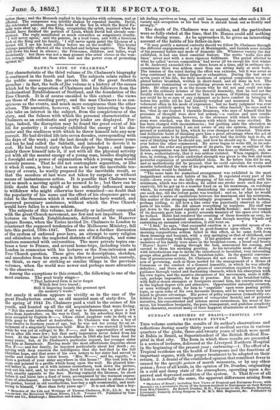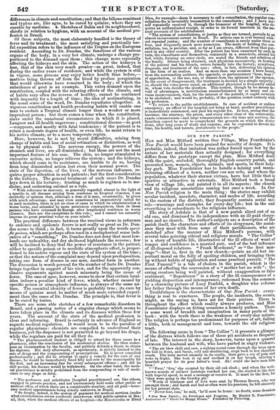DITNBAS'S SKETCHES OF BRAZIL—TROPICAL AND EUROPEAN FEVER.*
Tins volume contains the results of its author's observations and reflections during nearly thirty years of medical service in various quarters of the globe, three-and-twenty years of which were spent at Bahia in Brazil, as Superintendent of the British Medical Hos- pital in that city. The form in which these results are presented is a series of lectures, delivered at the Liverpool Northern Hospital in the beginning of the present year; embracing-1. The effect of a Tropical residence on the health of Europeans and the functions of important organs, with the proper treatment to be adopted on their return. 2. A. denial of the established opinion that remittent fever is caused by the specs,* poison of marsh miasmata, or by any other poison; fever of all kinds, in the opinion of Dr. Dundas, originating m a cold and damp state of the atmosphere, operating upon a de- praved and depressed condition of the system. 3. That fever of all kinds is essentially the same, the apparent differences arising from
• Sketches of Brazil; including New Views of Tropical and European Fever, with Remarks on a premature Decay of the System incident to Europeans on their Return from Hot Climates By Robert Dundas, M.D., Physician to the Northern Hospital, Liverpool; formerly Acting Burgeon to H. M.'s 60th Regiment, Ste. Published by Churchill. • "The professors and substitutes [hospital practitioners] are, like others, engaged in private practice, and not uncommonly hold some other public or medical office, of which there are a considerable number, and all paid—hono- rary medical appointments being utterly unknown in irazil. "So deeply, indeed, is the system of payment for medical services (under what circumstances soever rendered) interwoven with public opinion in Bra- zil, that, when the medical officers of an hospital—the Misericordia or Hotel
differences in climate and constitution and that the bilious remittent and typhus are like ague to be cured by quinine, where they are curable by medicine. 4. ketches of Bahia and ha neighbourhood, chiefly in relation to hygiene, with an account of the medical pro- fession in BraziL Of these subjects, the most elaborately handled is the theory of fever and its treatment; the most satisfying and practically use- ful exposition refers to the influence of the Tropics on the European resident. According to Dr. Dundee, the functions of the various organs of the body, in a very hot climate, undergo a change pro- portioned to the demand upon them ; this change more especially affecting the kidneys and the skin. The action of the kidneys is less, that of the skin very much greater—so great, indeed, that
during the earlier years of residence, and while the system is still in vigour, some persons may enjoy better health than before,— matters being thrown off from the blood by profuse perspiration that would otherwise have remained in the body; of which the subsidence of gout is an example. This extra demand upon the constitution, coupled with the relaxing effects of the climate, and of habits very often the reverse of healthy, cannot be continued with impunity for a length of time ; the idea of acclimatizing, in the usual sense of the word, Dr. Dundas repudiates altogether. A vigorous constitution and health-producing habits will enable one man to sustain a Tropical climate longer than a weaker or more imprudent person ; but there comes a time when the constitution sinks under the unnatural circumstances in which it is placed. Languor and ill-health supervene ; constitutional disease—as gout —reappears, and mostly with fatal tendencies : if the patient is to retain a moderate degree of health, or even life, he must return to his native climate, or to a more temperate region.
Here, however, he is met by moral difficulties, arising from change of habits and loss of social estimation or distinction, as well as by physical evils. The nervous energy, the powers of the stomach and liver, are all diminished ; but these are not the most important feature of his case. The skin, no longer stimulated to excessive action, no longer relieves the system ; and the kidneys, which should come to its assistance, are unable to do so, having from long diminished action lost even their normal power. The state of the digestion, of the liver, of the nervous influence, re- 5uires proper attention in such patients ; but the first consideration as the kidneys. The general treatment of such cases Dr. Dundas lays down in his lectures; trusting as much to regimen as to me- dicine, and eschewing calomel as a rule.
"With reference to mercury, so generally regarded almost in the light of a specific in all diseases arising from residence in Tropical climates, I am decidedly of opinion that, although a dose of it may, occasionally, be given with much advantage, and may even sometimes be imperatively called for in such maladies, there is yet no class of cases in which its administration is worse borne, and attended by more pernicious consequences, than in those persons who have returned to Europe after lengthened residence in warm climates. Rare are the exceptions to this rule ; and I cannot too earnestly impress its great practical value on your minds."
The practical difference between the received views in reference to endemic and epidemic fevers is not really so great as Dr. Dun- das seems to think ; in fact, it turns greatly upon the words speci- fic poison, which are perhaps often used in a metaphorical sense uidi- °alive of a "something." Dr. Dundas does not deny that most low- lands are unhealthy., and dry sheltered highlands the reverse; few will be inclined to deny that the power of resistance in the patient, either to specific poison or to morbific atmospheric effect, is propor- tioned to his native vigour and the state of his system at the time ; or that the nature of the complaint may depend upon predisposition, taking one form of disease in one man, another form in another. The discussion is worth perusal for the number of facts Dr. Dundas brings together in support of his view, and for the apparently con- clusive arguments against marsh miasmata being the cause of fever. The case of ague, however, seems to show that certain local- ities induce a peculiar kind of fever, which, whether caused by specific poison or atmospheric influence, is always of the same na- ture. The essential identity of fever is probably true ; its cure by means of quinine must be matter of much more extended experi- ment than the oases ofDr. Dundas. The principle is, that fever is to be cured by tonics.
There are some able sketches of a few remarkable disorders in Brazil, and a passing notice of a singular change which seems to have taken place in the climate and its diseases within these few years. The account of the state of the medical profession is clear and informing. Brazil is certainly in advance of England as regards medical regulation. It would seem to be the paradise of regular physicians : chemists are compelled to understand their business, yet the dispenser is not permitted to go beyond his drugs, while the regulars are paid for all they do.
"The pharmaceutical student is obliged to attend for three years in a pharmacy, after the conclusion of his academical studies. He then under- goes an examination by the faculty, and publicly defends a thesis to obtain his diploma. His duty afterwards, as apothecary, is strictly limited to the aale of drugs and the compounding of prescriptions. He is never consulted professionally ; and did he attempt to apply a remedy for the cure of any disease he would be immediately fined fifty mil-reis by the municipality for the first, and an increasing fine for every subsequent offence ; and did he still persist, his licence would be withdrawn. On the other hand, the medi- cal practitioner is strictly prohibited from the compounding or sale of medi- cines in any shape or form.
a
Dieu, for example—deem it necessary to call a consultation, the regular con- sultation-fee is invariably transmitted to the consultants ; and I have my.. self repeatedly received it, through the treasurer of the hospital, who re- quires an authenticated receipt, in order to its formal insertion in the an- nual accounts of the establishment "The system of consultations, or juntas as they are termed, prevails to an almost inconvenient extent in Brazil. No serious case is ever treated with_ out repeated juntas; and the number of consultants is rarely under three or four, and frevently much more numerous. The mode of holding the con- sultation, too, is peculiar, and, so far as I am aware, different from that pur- sued in any other country. After the patient has been examined by each in turn, the consultants seat themselves, commonly in a semicircle, around his bed, while, forming an outer circle, are seated the friends and relatives of the family. Silence being obtained, each physician successively, in hearing of the patient and his friends, enters formally into the history, symptoms, diagnosis, and treatment of the case ; often, in fact, delivering his opinion in the form of an oration. And on more than one occasion I- have heard, from the surrounding auditors, the appoiado, or parliamentary 'hear, hear !' of approbation, or the nao, nao, of dissent from the opinions of the speaker. In the event of disagreement, the treatment is decided by a simple majority or, should the votes prove equal, an additional physician is frequently callemi in, whose vote decides the question. This system, though by no means de- void of advantages, is nevertheless counterbalanced by so many and ob- vious inconveniences, that, for the interest of the patient, it ought certainly to be abolished ; and would be, probably, if the question rested entirely with the profession. "-To return to the public establishments. In case of accident or sudden emergency, an officer of the hospital not being at hand, another practitioner is immediately summoned, and paid his regular fee. In fact, seeing that the barrister, the attorney, the priest, and every other class of the community, exacts remuneration—and large remuneration too—for time and services, the Brazilian cannot be made to comprehend the grounds on which the doctor alone, after long years of study and expense, can be expected to devote his time, his health, and talents, gratuitously to the people."



























 Previous page
Previous page